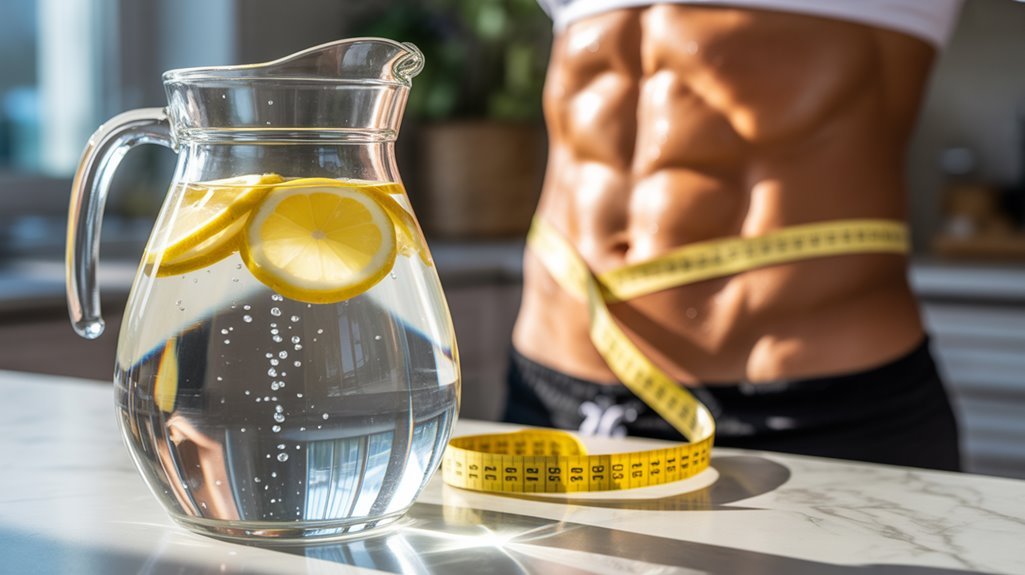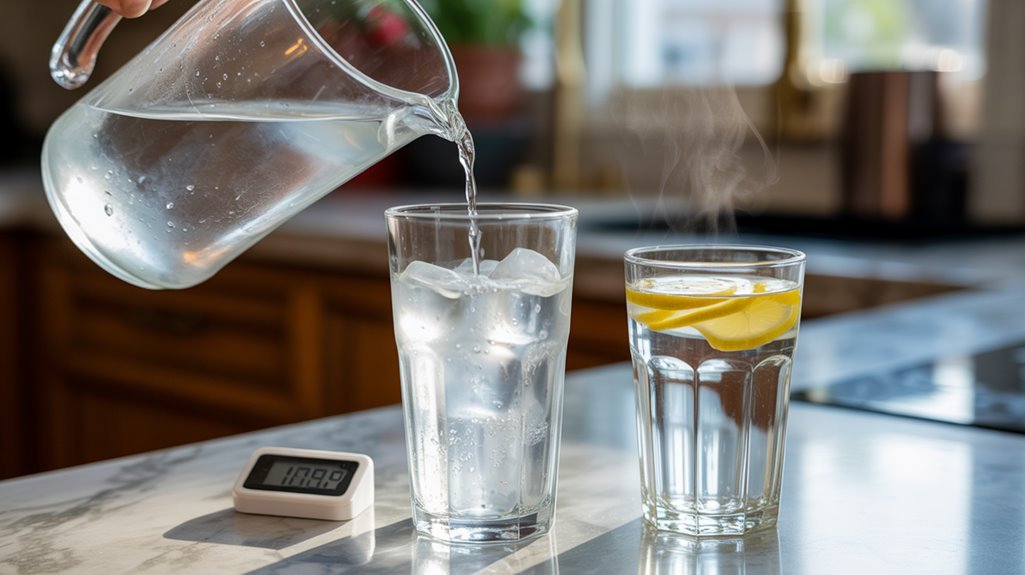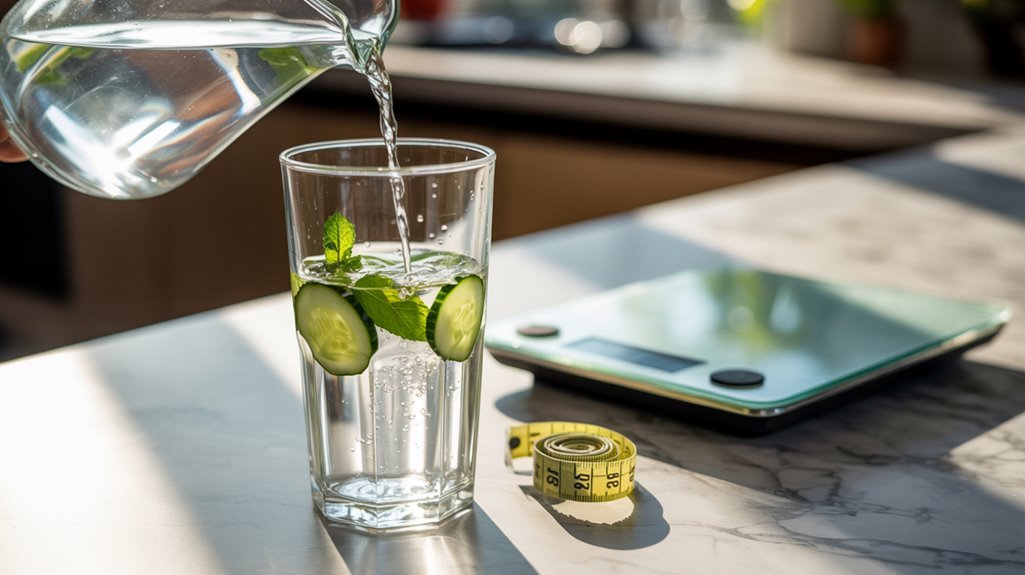Your body’s hydration directly controls metabolic efficiency through water-induced thermogenesis, increasing resting energy expenditure by 24-30%. You’ll burn more calories when cold water triggers metabolic responses, while proper hydration enhances lipolysis in adipocytes and optimizes liver beta-oxidation pathways. Pre-meal water consumption reduces caloric intake through gastric distension and CCK release. Adequate fluids regulate leptin, ghrelin, and insulin sensitivity while preventing ADH-induced water retention. Discover how precise hydration protocols maximize these fat-burning mechanisms.
Key Takeaways
- Drinking 500ml of water boosts metabolism by 24-30%, burning an extra 23 calories through thermogenesis
- Pre-meal hydration reduces caloric intake by 13-22% through gastric distension and appetite-suppressing hormone release
- Proper hydration enables efficient liver fat metabolism while dehydration slows metabolic pathways and increases cortisol
- Adequate water intake prevents compensatory water retention by regulating ADH and supporting kidney filtration
- Optimal hydration enhances exercise performance and post-workout fat burning by maintaining blood volume and oxygen delivery
Water Increases Your Metabolic Rate and Calorie Burn
When you drink water, your body must warm it to match your core temperature, triggering a process called water-induced thermogenesis that burns additional calories. This metabolic response increases your resting energy expenditure by approximately 24-30% within 10 minutes of consumption, lasting up to 60 minutes.
Cold water amplifies this effect, as your body expends more energy heating it. Studies demonstrate that drinking 500ml of water can burn an additional 23 calories through thermogenesis alone. While modest per instance, applying consistent hydration strategies throughout the day compounds these effects.
You’ll optimize metabolic efficiency by consuming 16-17 ounces of water before meals and maintaining steady intake between meals. This approach not only enhances thermogenesis but also supports enzymatic functions essential for fat oxidation and energy metabolism.
Proper Hydration Enhances Exercise Performance and Fat Oxidation
Although you’re maintaining ideal hydration levels throughout the day, your body’s fat-burning capacity during exercise depends greatly on adequate fluid balance before, during, and after physical activity. Dehydration reduces blood volume, limiting oxygen delivery to working muscles and compromising mitochondrial function—directly impairing fat oxidation rates.
Your hydration timing greatly influences substrate utilization. Consuming 500-600ml of water 2-3 hours before exercise optimizes plasma volume, while 200-300ml immediately pre-workout maintains fluid balance. During prolonged sessions, you’ll preserve exercise intensity by drinking 150-250ml every 15-20 minutes.
Well-hydrated muscles demonstrate improved lipolysis and fatty acid mobilization. Studies indicate even 2% dehydration decreases fat oxidation by 12-15% while increasing glycogen dependence. Post-exercise rehydration accelerates metabolic recovery, sustaining heightened fat-burning for hours afterward.
Drinking Water Reduces Appetite and Prevents Overeating
You can greatly reduce caloric intake by drinking 16-20 ounces of water 30 minutes before meals, as this mechanically distends your stomach and triggers satiety signals through vagal nerve pathways. Water consumption activates stretch receptors in your gastric walls, which communicate fullness to your hypothalamus and naturally suppress ghrelin production. This pre-meal hydration strategy enhances your body’s physiological appetite control mechanisms, helping you achieve a negative energy balance without conscious caloric restriction.
Water Before Meals Strategy
Executing a water-before-meals strategy can considerably reduce caloric intake through gastric distension-mediated satiety signaling. When you consume 16-20 ounces of water 20-30 minutes before eating, you’ll activate stretch receptors in your stomach that communicate fullness to your hypothalamus.
Pre meal hydration enhances cholecystokinin (CCK) release, a hormone that suppresses appetite and slows gastric emptying. You’re fundamentally priming your satiety mechanisms before food consumption begins. Research demonstrates this practice reduces meal energy intake by 13-22%.
Implement mindful drinking by setting reminders and tracking your water intake timing. You’ll notice decreased portion sizes without conscious restriction. This strategy works particularly well before high-calorie meals, where volume-induced satiety can prevent overconsumption of energy-dense foods.
Natural Appetite Suppression
Thirst signals often masquerade as hunger cues, leading to unnecessary caloric consumption when your body actually needs hydration. You’ll reduce caloric intake by recognizing natural thirst cues and executing proper hydration strategies.
Water acts as a natural appetite suppressant through several mechanisms:
- Gastric distension activates stretch receptors, signaling satiety
- Increased stomach volume triggers vagal nerve responses
- Proper hydration optimizes leptin and ghrelin balance
- Cellular hydration enhances metabolic signaling pathways
- Adequate fluid intake supports insulin sensitivity
You’re effectively managing hunger when you maintain consistent hydration throughout the day. Dehydration disrupts hormonal regulation, increasing cortisol and decreasing adiponectin levels. By drinking water regularly, you’ll distinguish between true hunger and thirst, preventing overconsumption while supporting metabolic efficiency and fat oxidation processes.
Stomach Fullness Signals
Water consumption directly triggers mechanoreceptors in the stomach lining, creating immediate fullness sensations that reduce appetite. When you drink water, your stomach stretches, sending neural stomach signals to your brain’s satiety center. This mechanical distension activates the vagus nerve, communicating fullness before you’ve consumed excess calories.
Research shows drinking 500ml of water 30 minutes before meals greatly reduces caloric intake. You’ll experience altered hunger cues as gastric distension initiates hormonal cascades, including increased GLP-1 and decreased ghrelin secretion. These physiological responses naturally suppress appetite for 60-90 minutes post-consumption.
Hydration Helps Your Liver Process and Eliminate Stored Fat

Your liver metabolizes stored fat through beta-oxidation, but it can’t perform this function efficiently when you’re dehydrated. Water enables your liver to flush out metabolic waste products and fat-soluble toxins that accumulate during lipolysis. You’ll need approximately 30-35 milliliters of water per kilogram of body weight daily to maintain the hepatic hydration necessary for ideal fat metabolism.
Liver’s Fat Metabolism Role
When you’re properly hydrated, your liver can efficiently perform its primary metabolic functions, including the breakdown and oxidation of fatty acids. Your liver function directly impacts how effectively you metabolize fat storage deposits throughout your body.
Key hepatic processes requiring adequate hydration:
- Beta-oxidation: Converts fatty acids into acetyl-CoA for energy production
- Ketogenesis: Produces ketone bodies from fatty acid breakdown
- Lipogenesis regulation: Controls new fat synthesis and storage
- Bile production: Emulsifies dietary fats for absorption
- Lipoprotein synthesis: Transports fats through your bloodstream
Without sufficient water intake, these metabolic pathways slow considerably. Your liver prioritizes detoxification over fat metabolism when you’re dehydrated, reducing its capacity to process stored adipose tissue. This metabolic shift can decrease fat oxidation rates by up to 30%, markedly impeding your body composition goals.
Water Enhances Detoxification
As toxins accumulate in your system, they’re often stored within adipose tissue alongside triglycerides, creating a barrier to effective fat mobilization. When you’re properly hydrated, your liver’s detox pathways function at their best, enabling efficient biotransformation of lipophilic compounds through phase I and II reactions. Water aids the transport of water-soluble metabolites through your kidneys for elimination.
Your body’s hydration benefits extend to enhanced lymphatic drainage, which removes metabolic waste from interstitial spaces surrounding fat cells. This process accelerates lipolysis by reducing inflammatory markers that inhibit hormone-sensitive lipase activity. You’ll need approximately 35ml of water per kilogram of body weight daily to maintain peak detoxification capacity. Without adequate hydration, toxic metabolites concentrate in your tissues, downregulating fat oxidation enzymes and compromising mitochondrial function.
Optimal Hydration Levels
While maintaining 35ml per kilogram represents baseline hydration, peak fat metabolism requires strategic fluid intake that supports hepatic lipid processing. You’ll enhance lipolysis by executing evidence-based hydration strategies that boost your liver’s capacity to metabolize adipose tissue.
Your ideal fluid intake depends on:
- Basal metabolic rate and thermogenic activity
- Exercise intensity and sweat loss volume
- Ambient temperature and humidity levels
- Sodium balance and electrolyte status
- Caffeine and diuretic consumption patterns
You should increase water consumption to 40-45ml/kg during active fat loss phases. Time your hydration around meals to support bile production and lipid emulsification. Monitor urine specific gravity below 1.020 to guarantee adequate hydration for hepatic fat oxidation. Distribute intake throughout the day, emphasizing morning consumption when cortisol naturally enhances lipolysis.
Water Temperature Affects Thermogenesis and Energy Expenditure

Cold water consumption triggers a thermogenic response that directly impacts your metabolic rate and energy expenditure. When you drink cold water, your body must expend energy to warm it to core temperature, burning approximately 8 calories per 8-ounce glass. This process, called cold-induced thermogenesis, activates brown adipose tissue and increases norepinephrine release.
While warm water doesn’t provide this thermogenic benefit, it enhances digestive enzyme function and nutrient absorption. Research indicates drinking 500ml of cold water at 3°C increases metabolic rate by 30% for 30-40 minutes post-consumption. You’ll maximize fat oxidation by consuming cold water before meals and during exercise. Nevertheless, warm water proves beneficial post-workout for ideal hydration absorption. Strategic temperature selection amplifies water’s metabolic effects beyond basic hydration needs.
Adequate Fluids Prevent Water Retention and Bloating
When you’re dehydrated, your body activates compensatory mechanisms that paradoxically increase water retention and trigger bloating. Your kidneys respond by releasing antidiuretic hormone (ADH), which signals your body to conserve water through sodium retention. This creates a cascade of physiological responses that worsen bloating reduction efforts.
Dehydration paradoxically triggers compensatory mechanisms that increase water retention and bloating through hormonal cascades.
Maintaining ideal hydration helps you:
- Regulate ADH secretion and minimize sodium-induced water retention
- Support lymphatic drainage and reduce interstitial fluid accumulation
- Enhance kidney filtration rate for proper electrolyte balance
- Decrease cortisol-mediated fluid retention
- Promote effective cellular waste removal
You’ll notice reduced abdominal distension and improved body composition measurements when you’re adequately hydrated. Consuming 30-35ml per kilogram of body weight daily prevents compensatory fluid retention while supporting metabolic processes that aid in fat oxidation.
Hydration Optimizes Hormone Balance for Fat Loss

Since your body’s hormonal signaling depends on proper cellular hydration, maintaining ideal fluid balance directly impacts fat-metabolizing hormones like insulin, leptin, and thyroid hormones. You’ll enhance hormone regulation when you’re adequately hydrated, as dehydration triggers cortisol release, promoting abdominal fat storage.
| Hormone | Hydration Effect | Fat Loss Impact |
|---|---|---|
| Insulin | Improves sensitivity | Reduces fat storage |
| Leptin | Enhances signaling | Controls appetite |
| Cortisol | Decreases levels | Prevents belly fat |
| Thyroid | Maintains function | Boosts metabolism |
Your adipocytes require proper hydration for lipolysis efficiency. When you’re dehydrated, heightened vasopressin disrupts metabolic processes, while optimal hydration supports growth hormone secretion during sleep. You’ll maintain balanced ghrelin levels, preventing excessive hunger and subsequent overeating that leads to increased adipose tissue accumulation.
Frequently Asked Questions
How Much Water Should I Drink Daily for Optimal Fat Loss?
You’ll optimize hydration strategies by consuming 30-35ml per kilogram of body weight daily. Your daily intake requirements increase with exercise intensity. Clinical evidence suggests maintaining consistent fluid consumption throughout the day supports metabolic function.
Can Drinking Too Much Water Hinder Weight Loss Efforts?
Yes, you can develop water toxicity from excessive intake, disrupting your hydration balance and electrolyte levels. This condition, called hyponatremia, impairs cellular function and metabolism. You’ll optimize weight loss by maintaining proper fluid equilibrium, not overhydrating.
Are Electrolyte Drinks Better Than Plain Water for Fat Burning?
You’ll find electrolyte benefits include enhanced cellular metabolism and improved muscle function during exercise. Nevertheless, clinical research shows plain water suffices for most hydration strategies unless you’re exercising intensely for over 60-90 minutes continuously.
Should I Drink Water Before, During, or After Meals?
Your meal timing affects hydration strategies differently. Research indicates you’ll optimize digestion by drinking water 30 minutes before meals, sipping minimally during eating, and resuming normal intake 60 minutes post-meal. This prevents diluting digestive enzymes.
Does Carbonated Water Have the Same Fat Loss Benefits?
Carbonated water benefits match regular water’s hydration effects. You’ll get identical sparkling water hydration for metabolic processes. Research confirms both provide equal fluid absorption, though carbonation may increase satiety, potentially reducing caloric intake temporarily.
Conclusion
You’ve learned that ideal hydration directly impacts fat metabolism through multiple physiological mechanisms. By maintaining adequate fluid intake, you’re improving metabolic rate, enhancing hepatic fat oxidation, regulating appetite hormones, and maximizing exercise-induced lipolysis. Don’t underestimate water’s thermogenic properties and its role in preventing fluid retention. Apply these evidence-based hydration strategies to maximize your body’s fat-burning potential. Remember, proper hydration isn’t just about thirst—it’s a critical component of effective body composition management.



